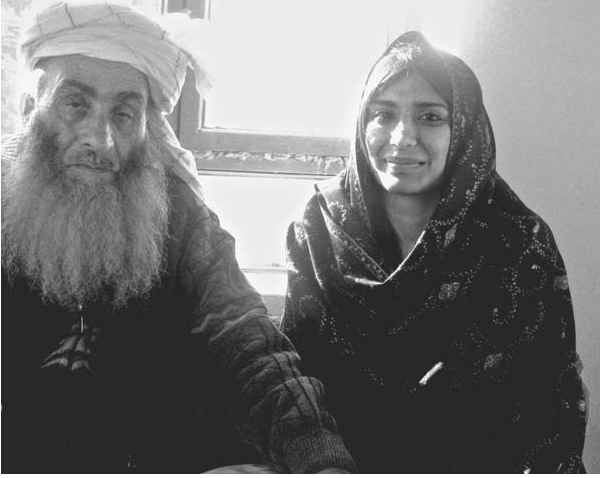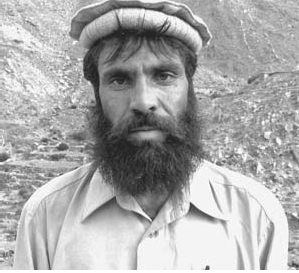My Guantanamo Diary (31 page)
Read My Guantanamo Diary Online
Authors: Mahvish Khan

“Can you take me to America with you so that I can have an operation
on my neck?” he asked.
I thought it was a joke. “What? You want to go to America?” I
asked, not believing that he would ever want to go to the United
States after his experience. “Why not England, France, or Germany?”
There was silence as all heads turned toward us. But the old
man really wanted to go to the United States, despite everything.
“Why not? I never had disliked America or Americans. I never
considered them my enemy, and I didn’t do anything to them,” he
said, opening up one of his tirades. “It was my own Afghans who betrayed
me. Not the Americans. The Americans were foolish to believe
lies and not to investigate, but they came to Afghanistan not knowing
anything or who they could trust. My real enemy was some dishonorable
lying Afghan who probably sold me to the Americans.”
Abdul Wahid joined in. “We have never been against the Americans.
We support the current government. I work with the new
democracy,” he said. “My father would like to go to America for
medical treatment, that’s all.” He explained that his father’s paralysis
could be cured with surgery. They had taken him to Islamabad,
Pakistan, many years before for an operation, but it had been unsuccessful,
and the surgeons said that the old man needed to go to Europe
or America for treatment.
Nusrat showed me the surgical scars on the back of his neck.
“
Bachai
, if you can help me get a visa, maybe I will be able to
walk again,” he said. “But I need permission to be a guest in America
to get the treatment first.”
I told him that it might be difficult for him to get a U.S. visa because
his classification as an enemy combatant hadn’t been rescinded
upon his release. If there was any possibility of getting a visa for the
purposes of seeking medical treatment, he would need some medical
documentation from his doctors stating that treatment for his paralysis
was not available in Afghanistan. I told him I’d look into it when I
got home. He seemed happy with that and encouraged me to eat more.
“Why are you eating like a bird? You need to gain some weight,”
he said.
A few hours later, I was ready to head back to Kabul, but the family
insisted that I stay for dinner, spend the night, and leave in the
morning. Nusrat said he wanted me to spend a few months with
him. I said everything I could think of to convince them to let me go,
promising that I’d stay longer the next time I visited, but after some
back-and-forth, Haji finally relented. “Next time you come, you
spend at least one month with my family,” he said. “If I find out you
ever came to Afghanistan and didn’t visit, I will be upset with you.”
I assured him I wouldn’t do that.
Before I left, I took some pictures to take back to Izatullah at
Gitmo.
“Make sure you tell him you saw me with your own eyes. Tell him
there is no difficulty and by the grace of the Almighty, he will be
among us very soon,” Nusrat said.
As I collected my things, he added, “Allah has made you a great
woman. You should marry a great Afghan man.”
“You think so?”
“Yes, I do. Marry a man of your
wathan
.”
I didn’t want to tell Haji that my fiancé was a white-bread American
from California. I knew he wouldn’t understand. Somewhere
along the way, I’d reached a level of equilibrium in my cultural balancing
act. I no longer struggled with the classic East versus West
identity crisis; I wanted to be accepted as a viable product of both
worlds. I handpicked the characteristics that suited me from both
cultures and left out the ones I didn’t care for. But I knew that others
wouldn’t always understand, and if I’d told Nusrat about my fiancé,
I think I would have eroded my own sense of peace with where
I now found myself.
At the same time, I felt, at some level, as though I was deceiving
him. It was the same way I felt at Guantánamo. I’d never told any of
the prisoners that I was engaged to an American man, someone with
no roots in Afghanistan, or any Middle Eastern country for that
matter. I knew that they all expected me to be a good Pashtun girl
who played by their centuries-old rules. I’d tried to tell the truth
once, when my client Hamidullah al-Razak kept plying me with personal
questions. I tried to dodge them initially, but part of building a
relationship and trust with your clients is engaging them not just on
a legal level but on a personal one as well. So, I finally relented and
told him about my fiancé. I was happily surprised when he accepted
it easily, and I felt better about not having lied to him. But on the following
trip, I was met by a cross-armed, stern-faced Mohammad Zahir,
a fifty-four-year-old Ghazni schoolteacher, who wasn’t thrilled
by the rumor he’d heard, and I had to backtrack on my story. I felt
badly about lying, but Gitmo is such a delicate and intense environment
that I felt it was wisest.

Haji and I.
Photo by Abdul Wahid.
But I really cared about Haji Nusrat. I knew that he had been tortured,
humiliated, beaten, and imprisoned without charge for many
years, that he’d been through so much at the hands of Americans.
And yet, I didn’t have it in me to try to reason with him and explain
my position.
I knelt back down and told him he looked better than I’d imagined.
I was happy to see him free, and I prayed that his son would
join him in Afghanistan soon too. He took my hands in both of his
and gave them a squeeze.
“You’re a good daughter. You kept your promise,
bachai
,” he said.
“Today, you made me happy. God is great, and God is merciful.”
“Take good care of yourself, and I’ll see you and Izatullah next
time I am here, inshallah” I replied.

On the night of October 9, 2006, guards informed four men in Camp
3, Block 1 that they would be sent home on the night of October 11.
Goatherd Taj Mohammad was one of them. He was ecstatic. The
night before his flight, he could hardly contain himself. He could
barely speak and prayed nonstop, asking everyone in adjacent cells
to pray as well that the news was true.
The next night, guards accompanied by Red Cross workers came
to fetch the men. They were all given white uniforms and white shoes
for the flight home and transfer of custody in Afghanistan. I suppose
it would make for a bad photo op if the U.S. military released “noncompliant”
detainees in tan and orange prison garb. Once the men
were dressed and ready, the guards unlocked their cages one by one,
as other prisoners looked wistfully on.
When I met with Abdullah Wazir Zadran on the morning after
Taj’s departure, he said the place would be very quiet without him.
Zadran was happy for his
friend, but I sensed a twinge of
envy too. The two had become
close while imprisoned together.
Taj stays in touch with Abdul
Salam Zaeef in Kabul and asked
Zaeef to pass on his contact information
to me. I tried calling
him, but we ended up playing
phone tag; he travels an awful lot
for a goatherd and is often not in
town. When he was, I had a
friend of mine go to his village
and take a picture of him nine months after his release. He also wrote
me to say that he’d like a copy of this book—in Pashto and in English.

Taj Mohammad in Kunar after his release.
Photo courtesy of Nimatullah Karyab.
When I do get hold of him, I plan to find out whether he’s still interested in taking a second wife, from America.

The families of Salah al-Aslami and the two Saudi prisoners who
the U.S. military said committed suicide at Gitmo on June 10, 2006,
continue to mourn their deaths. Al-Aslami’s young widow, Hayat
Warshad Ali, still hasn’t recovered and remains bedridden in the
family home.
The U.S. military has never conducted a conclusive investigation.
To date, the Department of Defense (DOD) has also refused
to release the suicide letters that were supposedly written before the
men hanged themselves. The DOD has also continued to turn down
requests for anatomical samples of the organs removed from the
victims’ bodies.
